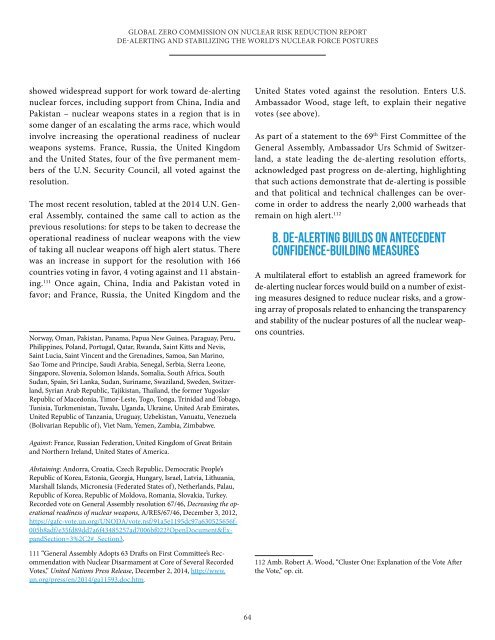global_zero_commission_on_nuclear_risk_reduction_report
global_zero_commission_on_nuclear_risk_reduction_report
global_zero_commission_on_nuclear_risk_reduction_report
Create successful ePaper yourself
Turn your PDF publications into a flip-book with our unique Google optimized e-Paper software.
GLOBAL ZERO COMMISSION ON NUCLEAR RISK REDUCTION REPORTDE-ALERTING AND STABILIZING THE WORLD’S NUCLEAR FORCE POSTURESshowed widespread support for work toward de-alerting<strong>nuclear</strong> forces, including support from China, India andPakistan – <strong>nuclear</strong> weap<strong>on</strong>s states in a regi<strong>on</strong> that is insome danger of an escalating the arms race, which wouldinvolve increasing the operati<strong>on</strong>al readiness of <strong>nuclear</strong>weap<strong>on</strong>s systems. France, Russia, the United Kingdomand the United States, four of the five permanent membersof the U.N. Security Council, all voted against theresoluti<strong>on</strong>.The most recent resoluti<strong>on</strong>, tabled at the 2014 U.N. GeneralAssembly, c<strong>on</strong>tained the same call to acti<strong>on</strong> as theprevious resoluti<strong>on</strong>s: for steps to be taken to decrease theoperati<strong>on</strong>al readiness of <strong>nuclear</strong> weap<strong>on</strong>s with the viewof taking all <strong>nuclear</strong> weap<strong>on</strong>s off high alert status. Therewas an increase in support for the resoluti<strong>on</strong> with 166countries voting in favor, 4 voting against and 11 abstaining.111 Once again, China, India and Pakistan voted infavor; and France, Russia, the United Kingdom and theNorway, Oman, Pakistan, Panama, Papua New Guinea, Paraguay, Peru,Philippines, Poland, Portugal, Qatar, Rwanda, Saint Kitts and Nevis,Saint Lucia, Saint Vincent and the Grenadines, Samoa, San Marino,Sao Tome and Principe, Saudi Arabia, Senegal, Serbia, Sierra Le<strong>on</strong>e,Singapore, Slovenia, Solom<strong>on</strong> Islands, Somalia, South Africa, SouthSudan, Spain, Sri Lanka, Sudan, Suriname, Swaziland, Sweden, Switzerland,Syrian Arab Republic, Tajikistan, Thailand, the former YugoslavRepublic of Maced<strong>on</strong>ia, Timor-Leste, Togo, T<strong>on</strong>ga, Trinidad and Tobago,Tunisia, Turkmenistan, Tuvalu, Uganda, Ukraine, United Arab Emirates,United Republic of Tanzania, Uruguay, Uzbekistan, Vanuatu, Venezuela(Bolivarian Republic of), Viet Nam, Yemen, Zambia, Zimbabwe.United States voted against the resoluti<strong>on</strong>. Enters U.S.Ambassador Wood, stage left, to explain their negativevotes (see above).As part of a statement to the 69 th First Committee of theGeneral Assembly, Ambassador Urs Schmid of Switzerland,a state leading the de-alerting resoluti<strong>on</strong> efforts,acknowledged past progress <strong>on</strong> de-alerting, highlightingthat such acti<strong>on</strong>s dem<strong>on</strong>strate that de-alerting is possibleand that political and technical challenges can be overcomein order to address the nearly 2,000 warheads thatremain <strong>on</strong> high alert. 112B. DE-ALERTING BUILDS ON ANTECEDENTCONFIDENCE-BUILDING MEASURESA multilateral effort to establish an agreed framework forde-alerting <strong>nuclear</strong> forces would build <strong>on</strong> a number of existingmeasures designed to reduce <strong>nuclear</strong> <strong>risk</strong>s, and a growingarray of proposals related to enhancing the transparencyand stability of the <strong>nuclear</strong> postures of all the <strong>nuclear</strong> weap<strong>on</strong>scountries.Against: France, Russian Federati<strong>on</strong>, United Kingdom of Great Britainand Northern Ireland, United States of America.Abstaining: Andorra, Croatia, Czech Republic, Democratic People’sRepublic of Korea, Est<strong>on</strong>ia, Georgia, Hungary, Israel, Latvia, Lithuania,Marshall Islands, Micr<strong>on</strong>esia (Federated States of), Netherlands, Palau,Republic of Korea, Republic of Moldova, Romania, Slovakia, Turkey.Recorded vote <strong>on</strong> General Assembly resoluti<strong>on</strong> 67/46, Decreasing the operati<strong>on</strong>alreadiness of <strong>nuclear</strong> weap<strong>on</strong>s, A/RES/67/46, December 3, 2012,https://gafc-vote.un.org/UNODA/vote.nsf/91a5e1195dc97a630525656f-005b8adf/e35fd89dd7a6f43485257ad7006bf022?OpenDocument&ExpandSecti<strong>on</strong>=3%2C2#_Secti<strong>on</strong>3.111 “General Assembly Adopts 63 Drafts <strong>on</strong> First Committee’s Recommendati<strong>on</strong>with Nuclear Disarmament at Core of Several RecordedVotes,” United Nati<strong>on</strong>s Press Release, December 2, 2014, http://www.un.org/press/en/2014/ga11593.doc.htm.112 Amb. Robert A. Wood, “Cluster One: Explanati<strong>on</strong> of the Vote Afterthe Vote,” op. cit.64


